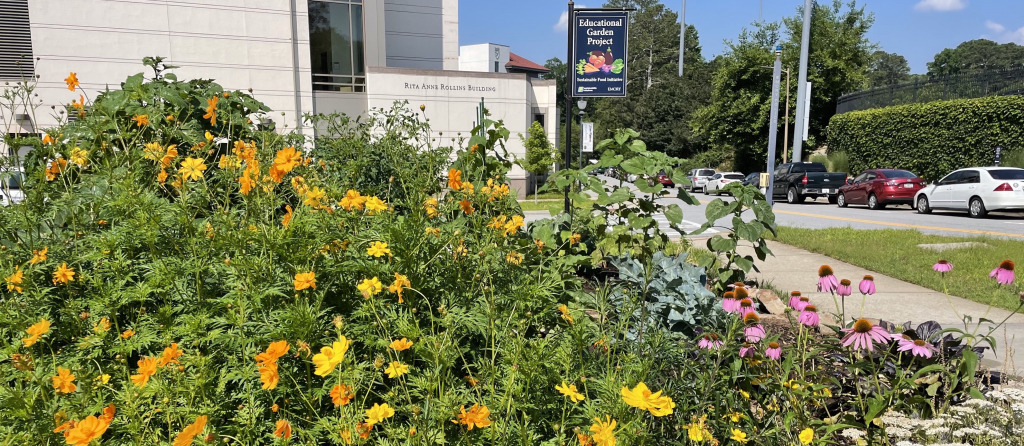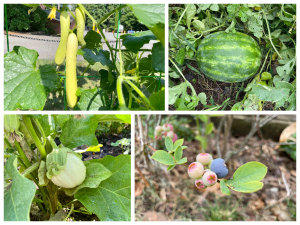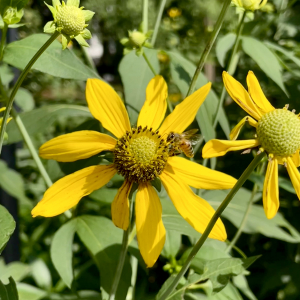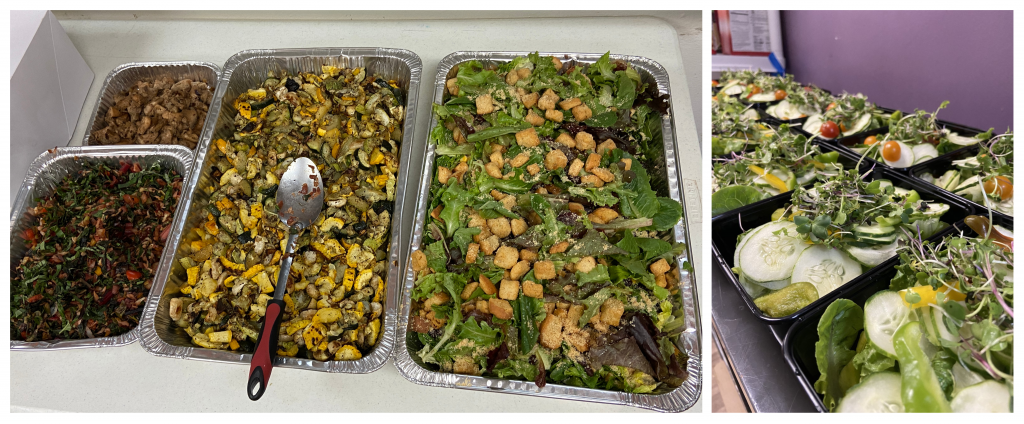By Morgan Finch, Gardens & General Sustainability Intern, Office of Sustainability Initiatives

As you walk through campus, you may notice the lush greenery of one of Emory’s educational gardens. Eight educational gardens are scattered across Emory’s campus, growing a variety of seasonal fruits and vegetables, herbs, and flowers. In the summertime, the gardens are filled with fresh produce, including tomatoes, cucumbers, peppers, tomatillos, green beans, sweet potatoes, and watermelons.
The Emory Educational Gardens Project (EEGP) is led by Erik Edwards, Research Greenhouse Manager and Educational Gardens Coordinator. Student, faculty, and staff volunteers help care for the gardens and perform maintenance tasks such as weeding, planting, watering, and harvesting. The Educational Gardens provide space for volunteers to deepen their understanding of sustainable food production, connect with the community, and access healthy, organic foods. All members of the Emory community are invited to participate in open workdays, which are one hour long for each garden.

Building community around gardening & sustainability
Many volunteers use gardening as an opportunity to get outside and take a break from class or work. Kozbi Bayne, a neuroscience and creative writing student, started volunteering in the Theology Garden as part of Professor Heather Christle’s first-year seminar, “Writing in the Garden.”
“Volunteering in the garden allows me precious time to work with my hands rather than only with my mind,” said Kozbi. “It is a huge stress reliever and has helped me feel welcome and connected on campus during busy semesters.”
Volunteers build community by working and growing food together. They are introduced to new varieties of vegetables not typically found in grocery stores, such as white eggplant and white cucumber. Seeing the growth of the gardens over time, from seed to harvest, gives volunteers a great sense of accomplishment. “My favorite thing about the gardens is being able to see the results of all the hard work and efforts we put into it,” commented Blair Sheppard, staff member at the Office of Financial Aid.
Through the Emory Autism Center’s myLIFE Program, adults with autism can participate in guided volunteer hours at the Clairmont Garden. Participants in the program engage in activities, such as gardening, that allow them to learn independence and expand their social and personal skills. The EEGP serves as a valuable learning opportunity and introduces volunteers to gardening as a new hobby and life skill.
The EEGP reflects Emory’s commitment to sustainability by increasing access to locally grown foods through small-scale food production. The Educational Gardens use sustainable practices, such as planting native species, composting, mulching, eliminating the use of harmful chemicals and pesticides, and using no till agriculture. Eating seasonal, local foods also decreases food miles, or the distance it takes for produce to reach consumers. These sustainable gardening practices are less intensive on the environment, reduce waste, and leave a smaller carbon footprint.
The Educational Gardens increase biodiversity and green space on campus, providing a safe habitat for pollinators. The gardens contain pollinator-friendly flowers, such as large blooms of echinacea, calendula, yarrow, milkweed, and sunflowers. The Cox Bridge Garden is part of the Rosalynn Carter Butterfly Trail, a network of gardens serving as a path for migratory butterflies. The Cox Bridge Garden was enhanced with a grant from the OSI Incentives Fund. Students from the Emory Ecological Society used funding to plant a native pollinator garden in the Cox Bridge ravine.

Strengthens food security
The Emory Educational Gardens Project increases access to fresh, healthy foods on campus and in the surrounding community. All volunteers are welcome to harvest and take home the fruits of their labor. One student commented that they enjoy picking strawberries from the Cox Bridge Garden when walking between classes. The EEGP also donates surplus produce to food banks in Tucker, Georgia.
This summer, the Educational Gardens is partnering with Slow Food Emory, a student-led organization dedicated to fighting food insecurity. Sabrina Li, co-president of Slow Food, says that their goal is to “reduce food waste, increase access to fresh, seasonal produce, and get students involved in sustainable cooking.” Slow Food Emory harvests from the Educational Gardens every week. Cooked meals are donated to the Nicholas House–a shelter for families experiencing homelessness, Free99 Fridges, and cancer patients undergoing treatment at Hope Lodge.

“With these vegetables we’ve made roasted potatoes (a favorite among the children at Nicholas House), roasted eggplant and squash, sautéed okra, tomato, and corn, cucumber salad. . . and slow cooked collard greens with bacon and beans,” said Sabrina. “We are so happy that we can share freshly picked produce from our own school gardens.”
If you would like to get involved with the Emory Educational Gardens Project, email gardens@emory.edu to join the gardens listserv and get connected! Follow Emory’s Office of Sustainability Initiatives on Instagram (@emorysustainability), Twitter (@EmoryGreen), and Facebook for more updates.
